Interview with the creators of GODS AND GENERALS (2003)—including Ted Tuner, Director Ron F. Maxwell, Robert Duvall, Jeff Daniels, Donzaleigh Abernathy, and Stephen Lang
by Chris Monroe
Staff Writer
Also see our REVIEW of “Gods and Generals”

Prior to the release of “Gods and Generals,” I sat down with the generals responsible for creating the picture: producer Ted Tuner, Robert Duvall (General Robert E.Lee), Jeff Daniels (Colonel Joshua Lawrence Chamberlain), Donzaleigh Abernathy (Martha), Stephen Lang (Stonewall Jackson), and Director Ron F. Maxwell. Since the film involves such prominent issues of God and faith, the discussion led right to these topics and produced some intriguing insights, a few of which came, surprisingly, from the always outspoken Ted Turner.
Ted Turner
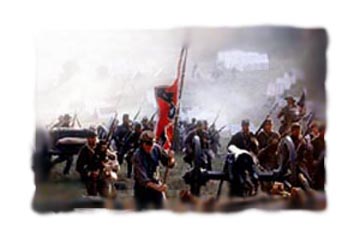
At the beginning of the project, to make the movie would require 1% of Ted Turner’s assets. But that was before he relinquished control of AOL Time Warner; after that, the required investment grew to about 15% of his net assets. Turner decided to go ahead and back the film anyway, and a comment he made during the interview could provide a clue as to why.
Turner’s approach to the questioning was highly candid and jovial. Referring to going to Heaven, he said he wouldn’t have box seats on the 50-yard line, but would be like the guy with tickets up in the nosebleed section at a football game. He said he lives like a Christian, by all of the good things he has done, and when he gets to Heaven he will tell St. Peter, “Hey, remember ‘Gods and Generals’.”
He admitted to being a very outspoken person and apologized for comments he made in the past that offended people. He said that he doesn’t see the benefit in offending people and referred to Jesus, saying that we need to do like He did and love each other.
Fascinatingly, Turner also did not hesitate to discuss his own personal experiences with faith and belief in God. He admitted that at the age of 17 he planned on being a missionary and later also attended seminary for six years, but lost his faith in God when his sister died of lupus. He said he remembers praying fervently for her, and couldn’t understand how God would let her die.
Why does God allow innocent people to suffer? Answer
What about the issue of suffering? Doesn’t this prove that there is no God and that we are on our own? Answer
Does God feel our pain? Answer
ORIGIN OF BAD—Why are there bad things in our world? Answer
Did God make the world the way it is now? What kind of world would you create? Answer
Why aren’t my prayers answered? Answer
Prayer in the Bible
Turner said he is very motivated to promote this film because he knows it will do well with critics and with people “with respect for religious beliefs.” He stated his reason for getting behind a film like this was because the mini-series Gettysburg was such a success. He also wanted to be involved because he hadn’t seen a film showing faith and religion in such a positive light as “Gods and Generals” in a long time.
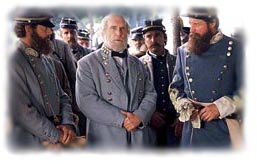
Robert Duvall
Bringing a history of stellar films to the table, it was hard to keep the conversationto just insight about “Gods and Generals” and his character Robert E. Lee when interviewing Robert Duvall. “The Apostle” was relevantly discussed in light of this film and, quite prominently, so were topics of faith and religion. Duvall still keeps in contact with religious leaders in the South and divulged about two documentaries his girlfriend is making—one about author Horton Foote and the other about country singer Billy Joe Shaver. Duvall said that Billy Joe Shaver lost his wife, his mother, his only son, and had a heart attack all in one year. When asked how he survived all of that, Billy Joe Shaver’s response was, “Jesus Christ.” These subjects are familiar to Duvall who also played the lead in Tender Mercies (written by Horton Foote) who has a conversion experience with God.
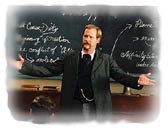
Jeff Daniels
Having begun research on his character over ten years ago, Jeff Daniels had a lot of insight into the life of Colonel Joshua Lawrence Chamberlain. After meeting so many people who regarded Chamberlain as a saint, Daniels said that he had to work to make him human as well. This meant finding flaws and weaknesses in Chamberlain—a rather tough job considering that one elderly lady assured him that the Colonel simply didn’t have any!
Overall, though, Daniels’ approach to portraying Chamberlain was that he saw everything “through the eyes of God.” Furthermore, Chamberlains’ faith and spirituality was something that Daniels saw as true and pure. It was engrained in who he was, and it was evident in his pursuit of righting a wrong and helping achieve justice for the slaves in the South.
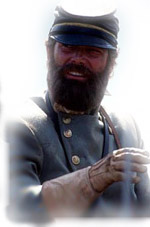
Stephen Lang
Stephen Lang, who played Stonewall Jackson, had the most work to do in this film in portraying a person with faith in God. Besides being the lead character, he also had the bulk of scenes enacting moments of prayer. Lang said that Jackson’s belief in God was more than just a “Sunday relationship,” but it was something that he lived on a “moment to moment basis.”
According to Lang, Jackson’s relationship with God informed all of the relationships he had and was “a lens that colored and focused everything he did.” Jackson’s idea of what would transpire through the war was that God’s will would be done. It seems the film doesn’t focus too greatly on Jackson’s weaknesses, but Lang saw them as Jackson being merciless at times and difficult to serve under.
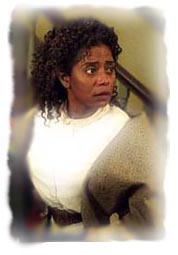
Donzaleigh Abernathy
Donzaleigh Abernathy, daughter of Civil Rights leader Ralph David Abernathy, admitted that her opinion of Stonewall Jackson before this film was, understandably, negative, assuming he was “all bad.” Through her research and the angle this film takes on Jackson, she was able to find the good things that he had done as well, such as helping slaves learn to read. However, she also reported of a scene that was cut from the film in which her character, Martha, takes her children upstairs and prays for the Yankees to be victorious and give the slaves their freedom. According to Abernathy, it was faith in God that kept Martha going.
Ron Maxwell

Ironically, director Ron Maxwell was the only professed Christian present at the inteview, yet he spoke of faith and God the least. However, this was not necessarily discouraging as his passion and integrity as artist and as a filmmaker shown through and inspired all. To start with, he recounted the day of filming that took place on September 11, 2001—the day America was attacked. Coincidentally, the battle they were filming that day was the bloodiest battle ever fought on American soil. Once news broke about the tragedies in New York and Washington, D.C., Maxwell stopped shooting and gave the crew time to make phone calls and process what was happening. After lunch, he told the crew he was going back to work and they could join him if they wanted. Everyone returned. Ron believes this film flies right in the face of what the terrorists were trying to destroy because it’s our story as Americans.
Ron Maxwell’s interview was by far the most stirring. When asked about the three and-a-half hour length of the film and how audiences would receive it, he had no problem defending his position. His first major reason for making the film this length (actually cut back from five and-a-half hours) was due to the backing of Ted Turner who defended Ron, telling others it would be as long as Ron decided it needed to be. Later in the interview he referenced how Richard Wagner had backing from King Ludwig when he was writing The Ring of the Needleoden. In light of that Ron quipped, “Thank God I have Ted Turner.”
Secondly, as an artist, Ron professed that he does not view audiences as merely consumers but as his fellow neighbors and friends. Today he feels the cart is before the horse in trying to determine the length of a film by how many people they can get in and out of a theater in order to make more money. He rhetorically asked, “Is every play the same length? Every opera? Every song? Then why should all films be the same length?” He also referred to films of the past that were just as long and included an intermission. The impulse to tell stories is human, but he criticizes that marketers do not concern themselves with humanity, but with packaging. He demanded that we must insist that all creative matters rest with the artist.
Ron Maxwell’s hope is that future artists will be emboldened by this film and its length to break out of the cookie-cutter mentality regarding film projects. Hopefully, the inspiration from this film will not be limited to only the length of future films, but will be, in my opinion, a building block for other artists who love God. Surely there is a future for believers to create films—and certainly other forms of art—that reflect their faith in Jesus Christs and seek to glorify Him creatively.
(Looking for our film review? Click here.)